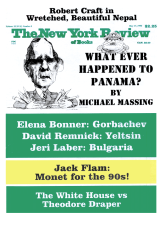In response to:
Lucy and Lucifer from the March 1, 1990 issue
To the Editors:
I hope you will allow me to defend myself against one of the charges made by Robert M. Adams in his review of my Protocols of Reading [NYR, March 1]. Adams, whom I know to be a humane and generous man, is simply unfair in accusing me of writing in prose that is not “clear and reasonable,” and he is especially unfair in the way he goes about proving his case. He summarizes two pages of my discussion in a few tangled sentences of his own, concluding with this: “However, Scholes continues, we will approach Derrida and his alternative through a very different thinker, Stanley Rosen, whose thought derives from Plato, and who opposes Richard Rorty as well as Derrida because he or they derive(s) from ‘Heidegger’s interpretation of Anaximander, with the crucial difference [contributed in an unspecified text by an unspecified author] that Sein is replaced by Nichts.’ To employ this sort of prose in a discussion of protocols of reading seems to me not far from insulting.”
Let me say only that Adams has made his case against my “prose” here without quoting a single word of it. What he quotes is in fact the prose of Stanley Rosen (and clearly attributed to him in my text), which makes a good deal more sense in Rosen’s context, and even in my own, than it does in Adams’s purposefully garbled summary. My guess is that Adams was working from notes and just got confused. If not, it seems to me that he could use a few protocols of reading and writing himself.
Robert Scholes
Barrington, Rhode Island
Robert M Adams replies:
I’m sorry if in my omnibus review of literary critics I appeared to have misrepresented Mr. Scholes (of whom I have most agreeable recollections from our overlapping days at Cornell). But that I did in fact misrepresent him I vigorously deny. It is true that in the passage of which I complained there was one sentence of direct quotation woven into several sentences of descriptive paraphrase. But the responsibility of making the whole passage clear to a reader lay, as I saw it, with the writer of the book. Instead of a tangle of glancing allusions to brief snippets from unexplained authors writing on unknown topics, I thought he should have expressed his point briefly and directly.
Just for the record, I wrote my review, not from vague recollections or jumbled notes, but with the original passage directly in front of me. Having read it over again, I do not recede from my position that it’s unnecessarily confusing.
This Issue
May 17, 1990



